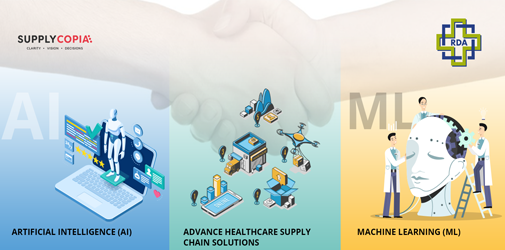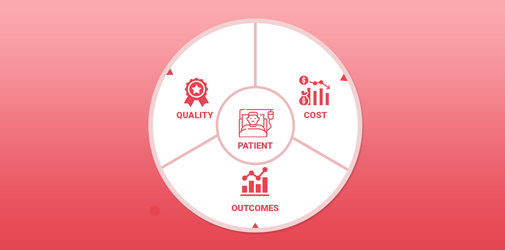ASHOK MUTTIN | December 23, 2021
Oracle acquisition of Cerner for
$28.3B - An early Christmas Surprise?
Since this news broke out in leading publications last week, I have received dozens of calls from friends, colleagues, and customers. So, what do you make of this acquisition?
For those who are closely connected to healthcare, this is one of the biggest if not the most significant news/surprise (depending on where we are sitting). If it goes through regulatory approvals, this acquisition will have far-reaching effects on healthcare delivery and its competitive landscape, more than most people would recognize.
Market Response: At the time of writing this article, markets didn’t respond favorably to the news of the potential acquisition. Oracle shares fell by single digits.
While it’s impossible to get inside the mind of Larry Ellison, Founder and current CTO of Oracle, and his leadership team. It’s interesting to piece together scenarios based on publicly available data sources.
Acquiring entry into a new, growing, and lucrative market: If you are looking to enter the healthcare, EMR/EHR market, then your options are restricted to Epic, Cerner, and Meditech. Considering Meditech’s smaller market share, the potential candidates reduce to just the top two. If you are like me, who has followed the founder of Epic for several years, a founder who has publicly pledged to give away most of her wealth, there is a severe cultural mismatch between Oracle and Epic. So, Oracle makes an offer that Cerner cannot refuse!
What’s the play? Let’s peel the onion layer by layer and see what we end up with:
Topline growth & quality of revenues- We check both these boxes.
This acquisition is estimated to add $6 Billion to Oracles revenues when the transaction is completed. In addition, the consensus is that the quality of the revenues would be much higher, and the stickiness would be far more significant (while it is possible to swap one EMR/EHR for another, it’s very messy and dangerous, not for the weak-hearted)
Market share: Continued hunger for growth via acquisition. It continues to amaze us who have been watching Oracle from its database days. However, this one might have an exciting twist, unlike its acquisition of PeopleSoft or other software companies.
Let’s see the permutations and combinations that can come into play:
Health systems running Oracle/PeopleSoft ERP and Cerner- As a user, they are probably in the best place. They may be the first beneficiary of all the benefits of the integrated suite of applications.
Health systems running mid-market ERP systems and Cerner- if past is any indication, Oracle could be looking to capture this market share with the potential promise of interoperability, cloud, ease of use, reduced cost of ownership (TCO). This market share could be a significant addition to the Oracle ERP suite. This is also a substantial and direct threat to the mid-market ERP providers.
Health systems running Oracle ERP and Epic- Converting Epic users to Cerner. Theoretically, this looks like a tough challenge, but Hey….you are dealing with Larry Ellison here.
Cloud- It’s not a secret that Oracle has been a very slow adopter of the cloud. Is it sending a message to Amazon AWS via this expensive acquisition (Based on publicly available sources, Cerner is a client of AWS)
As everyone knows, healthcare has been significantly behind other industries in adopting new and innovative technologies (the reasons could fill a minimum of 2 books, more on it some other day!). So let’s look at how this acquisition holds up against the industry ambitions.
Interoperability: While this is the most heated discussion when stakeholders from multiple disciplines within an IDN meet (supply chain, clinical, financial, marketing), not much progress has been made regarding sharing the data within the systems and enterprise. A clinically integrated solution requires the integration of clinical, supply chain, payments, and demographics. Will Oracle change this status quo? If it succeeds, will that put pressure on Epic and others to implement a similar approach?
Data democratization: In my humble opinion, the most significant intellectual property is the data amassed by Cerner. It holds golden nuggets about patient demographics, material usage for the procedures, patient outcomes, procedure reimbursements. This data is so powerful that it can:
- Provide real-time feedback to product manufacturers on the effectiveness of their products
- Change physician behavior with relevant and actionable insights
- Educate the patient population ·
- Potentially reduce healthcare costs by 15-30%.
IBM Watson, Google Health, and a score of others claim to be working on such data democratization, but Oracle will OWN this data and use it as effectively as a Swiss army knife. This solution in itself could be a Billion-dollar industry down the line.
It will be fascinating to see how this plays out in the next few months. However, what cannot be discounted is Larry Ellisons’ desire to change the landscape single-handedly, case in point the America Cup & Indian Wells Tennis championship.
Disclaimer: This article has been written leveraging publicly available sources and a dose of imagination. The author has no insights into the inner workings of Oracle or Cerner and is not a shareholder in either of them.
More from SupplyCopia



 ALL Solutions
ALL Solutions 
